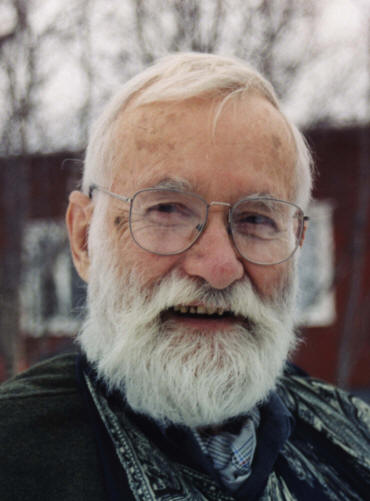Walter Jackson Freeman III
Walter Jackson Freeman III (April 14, 1927 – May 31, 2016) was an American biologist and neuroscientist known for his work in the field of neurodynamics. Freeman's research focused on how the brain generates the patterns of electrical activity that correspond to mental activities, including perception and consciousness. His work has had a significant impact on the fields of neuroscience, psychology, and philosophy of mind.
Early Life and Education[edit | edit source]
Walter Jackson Freeman III was born in Washington, D.C., into a family with a notable medical background. His grandfather, Walter Jackson Freeman II, was a pioneering neurosurgeon known for his role in popularizing the lobotomy in America. Despite his family's medical legacy, Freeman initially pursued a broader scientific education. He earned his Bachelor of Science in physics from the Massachusetts Institute of Technology (MIT) in 1950. He then shifted his focus to biology, receiving his Ph.D. in the subject from Yale University in 1955.
Career[edit | edit source]
After completing his Ph.D., Freeman joined the faculty at the University of California, Berkeley, where he spent the entirety of his academic career. At Berkeley, he established himself as a leading figure in the study of how the brain generates patterns of neural activity and how these patterns are related to sensory processing and behavior. Freeman's most notable contribution to neuroscience was his development of the theory of neural mass action, which describes how large populations of neurons in the brain interact to produce coherent patterns of electrical activity. This work laid the foundation for the field of neurodynamics, which studies the dynamics of neural systems. Freeman also made significant contributions to the understanding of the olfactory system, demonstrating how the brain processes smells and how this processing is related to memory and emotion. His research on the olfactory system provided insights into the more general mechanisms of neural processing and perception.
Philosophy and Legacy[edit | edit source]
Beyond his scientific contributions, Freeman was also known for his philosophical inquiries into the nature of consciousness and the mind-body problem. He was a proponent of the idea that the brain's chaotic dynamics are central to understanding consciousness. Freeman's interdisciplinary approach bridged gaps between neuroscience, psychology, and philosophy, making his work influential across these fields. Freeman authored over 450 articles and several books throughout his career, contributing significantly to the scientific literature on the brain and its functions. His work has been recognized with numerous awards and honors, reflecting his impact on the study of the brain and mind.
Death[edit | edit source]
Walter Jackson Freeman III passed away on May 31, 2016, leaving behind a legacy of pioneering research in neuroscience. His work continues to influence current research in neurodynamics, neural networks, and the study of consciousness.
See Also[edit | edit source]
Search WikiMD
Ad.Tired of being Overweight? Try W8MD's physician weight loss program.
Semaglutide (Ozempic / Wegovy and Tirzepatide (Mounjaro / Zepbound) available.
Advertise on WikiMD
|
WikiMD's Wellness Encyclopedia |
| Let Food Be Thy Medicine Medicine Thy Food - Hippocrates |
Translate this page: - East Asian
中文,
日本,
한국어,
South Asian
हिन्दी,
தமிழ்,
తెలుగు,
Urdu,
ಕನ್ನಡ,
Southeast Asian
Indonesian,
Vietnamese,
Thai,
မြန်မာဘာသာ,
বাংলা
European
español,
Deutsch,
français,
Greek,
português do Brasil,
polski,
română,
русский,
Nederlands,
norsk,
svenska,
suomi,
Italian
Middle Eastern & African
عربى,
Turkish,
Persian,
Hebrew,
Afrikaans,
isiZulu,
Kiswahili,
Other
Bulgarian,
Hungarian,
Czech,
Swedish,
മലയാളം,
मराठी,
ਪੰਜਾਬੀ,
ગુજરાતી,
Portuguese,
Ukrainian
Medical Disclaimer: WikiMD is not a substitute for professional medical advice. The information on WikiMD is provided as an information resource only, may be incorrect, outdated or misleading, and is not to be used or relied on for any diagnostic or treatment purposes. Please consult your health care provider before making any healthcare decisions or for guidance about a specific medical condition. WikiMD expressly disclaims responsibility, and shall have no liability, for any damages, loss, injury, or liability whatsoever suffered as a result of your reliance on the information contained in this site. By visiting this site you agree to the foregoing terms and conditions, which may from time to time be changed or supplemented by WikiMD. If you do not agree to the foregoing terms and conditions, you should not enter or use this site. See full disclaimer.
Credits:Most images are courtesy of Wikimedia commons, and templates, categories Wikipedia, licensed under CC BY SA or similar.
Contributors: Prab R. Tumpati, MD


